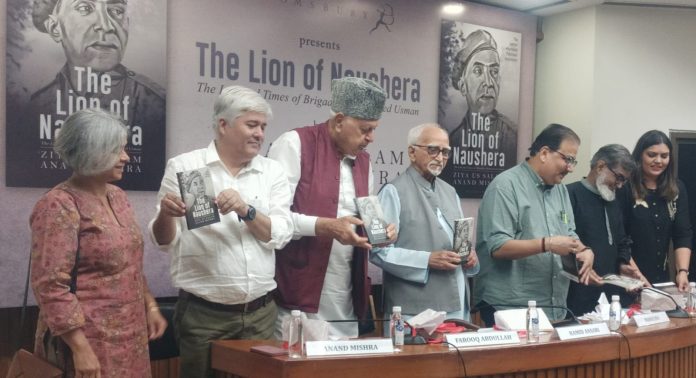– Mohd.Naushad Khan
Former Vice President of India, Hamid Ansari, released The Lion of Naushera on Friday evening. The book chronicles the life and heroism of Brigadier Mohammad Usman, India’s first Maha Vir Chakra awardee. The event took place at the India International Centre. Former J&K Chief Minister Dr Farooq Abdullah and RJD MP Manoj Jha also attended. The book is authored by senior journalist Ziya Us Salam and Anand Mishra, and published by Bloomsbury.
Ansari gave a personal tribute to Brigadier Usman. Their grandfathers were brothers, and Usman’s mother was Ansari’s father’s sister. He recalled Usman’s key role in the 1948 war, especially in defending Jammu during the Naushera battle. Ansari said his courage earned him military honours and a place in the nation’s memory. The Indian Army remembers him every year on July 3, with veterans attending and local TV covering the event.
Ansari praised the Usman Memorial Community Centre at Jangar. He called it a “timeless symbol of courage, patriotism, and integrity.” The centre has both physical and online presence (www.usmanmemorial.in). It helps young Indians learn about Usman’s leadership and sacrifice. Ansari called the book a timely reminder of the heroism of India’s formative years. He quoted historian Ramachandra Guha, who described Usman’s legacy as “mutative, inclusive secularism.” Ansari urged the nation to uphold these values today.
Dr Farooq Abdullah spoke on unity, patriotism, and the dangers of communalism. He praised soldiers’ sacrifices, regardless of religion. He said Muslims today face fear and discrimination. He criticised rewriting history and banning books. Abdullah stressed that no religion preaches hatred. He called for harmony among Hindus, Muslims, Sikhs, and Christians. Quoting religious and historical stories, from Moses and Pharaoh to Krishna and Arjuna, he reminded that truth always wins. He declared, “India will never die,” and urged citizens to unite as Indians against division.
MP Manoj Jha reflected on Usman’s symbolism. He recalled how Usman refused Mohammad Ali Jinnah’s personal offer to join Pakistan. He chose a secular India instead. Jha said many “Usmans” today must still prove their patriotism. He saw this as a change from the inclusive India Usman represented. He criticised growing communalism, contrasting it with the unity during Partition. He praised the authors for keeping Usman’s memory alive. He said religiosity and communalism are not the same. He described Usman as disciplined and Gandhian. “His life tells us who we were, and today’s reality shows what we have lost,” Jha said.
Author Ziya Us Salam shared how the book began. A morning walk brought a call from Bloomsbury offering him the project. At first, he hesitated due to limited knowledge. He prayed before accepting. Research was hard, as Usman was unmarried and left no children. With co-author Anand Mishra, he traced relatives, including Brigadier Gufran’s children, and visited Usman’s grave at Jamia.
Salam spoke of Usman’s patriotism during Partition. Many Muslim officers went to Pakistan, but Usman stayed in India. He refused Jinnah’s personal overtures. Salam said Usman’s choice helped unite the nation “from Kashmir to Kerala.” The authors said the book belongs to all Indians who value his sacrifice. “India belongs to all of us, and we all belong to India,” Salam said.
Brigadier Usman showed great courage in the Republic’s early days. In 1947–48, Pakistan attacked Jammu and Kashmir. Usman defended Naushera, earning the title “Lion of Naushera.” Twelve days before his 36th birthday, he was martyred fighting Pakistani forces. Some heroes got wide fame, but Usman was not always fully honoured.
The Lion of Naushera aims to change that. It tells of a soldier who fought for an India where all faiths, castes, and regions stood together. It is both a military biography and a reflection on a pluralistic nation’s sacrifices. Ansari said it is not just history, but a call for today’s generation to live by the values Usman stood for.




